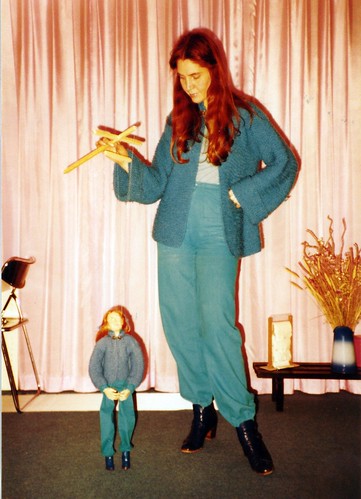
Photo Credit: Arne Hendriks via Compfight
You are the puppet master. You pull the strings. You push the buttons. And everyone around you powerlessly and unwittingly submits to your will.
This force that you hold over others is powerful but subtle. So subtle, in fact, that it goes undetected by even your closest loved ones, although they are the ones most strongly influenced by your manipulations.
So how are you able to pull off this amazing feat of deception? How are you able to manipulate and control those around you without ever giving even the tiniest clue that you are doing it? The answer is simple: because you yourself don’t realize you are doing it.
This theory of control was developed by Ernst Beier, who studied psychology to understand how he himself had been able to avoid death in the Nazi war camp by surprising his interrogators and breaking the normal patterns in relationships that people typically fall into.
According to Beier, although we may not realize it, we have evolved to learn how to control our environments and the people around us. The most powerful and effective way to do this is “unaware control,” because when the manipulator himself is not aware of the power they are exerting, it is virtually impossible to detect and avoid.
The only way to understand your own hidden and subtle communications is by “listening for the effects.” When you observe the patterns of the people around you, you must accept that they are behaving exactly as you want them to (for if they weren’t you would change your manipulative cues to get them to behave differently.)
![]() Photo Credit: Thomas Hawk via Compfight
Photo Credit: Thomas Hawk via Compfight
This is difficult to swallow, especially as we think of loved ones who are not at all behaving the way we want them to: the rebellious teenager, the controlling parent, the obnoxious co-worker, or the jealous lover.
Beier says that this contradiction stems from the compromises we make among many competing priorities. The rebellious teenager manipulates the parent to be more controlling so that they can feel more justified in establishing their own autonomy and expressing their own sense of righteous indignation. The controlling parent manipulates the teenager to be more rebellious to disavow any responsibility for the child’s behavior and to justify their own impatience.
In Beier’s analysis, these behavior patterns must be desired (on some level) because if they weren’t, the subject would change their subtle communications until the desired relationship was achieved.

Photo Credit: Kamal Zharif Kamaludin via Compfight
In any relationship, of course, the controller is also the controllee. So in a typical marriage, Beier says, “each partner unconsciously manipulates the other’s behavior in some ways; they soon reach a stalemate, locked into an initially attractive maze of controls and responses. Each believes himself free but is unknowingly constrained by the other . . . Each can move the other like a marionette, yet neither one is aware of the strings.”
The only way to break the patterns of control in any relationship (whether you wish to stop your own control or that of another,) is through “unexpected responses.” When a response deviates from the predetermined pattern, the program is broken and parties are forced to search for new behaviors to find new acceptable compromises.
An example is the woman who was getting angry every night because her husband was late to the dinner table. She changed the pattern by telling him dinner was ready 15 minutes before it actually was. This got him to the table on time and both were happy with the new pattern. Or there was the controlling mother whose rebellious daughter would never tell her where she was going. Only when she surprised her daughter by replying, “you’re right, it’s none of my business,” did her daughter then begin to open up to her.
And the best example of all is perhaps Beier’s own story, which can be found in his book, A Question of Belonging. Beier escaped his own death to the Nazis by responding to his Gestapo interrogator with quotes from Faust and engaging in an intellectual discussion. The events that transpired during his 11-hour interrogation led him to start studying psychology and examining this theory of control.
So tell me. Now that you know you are the puppet master . . . do you know which string to pull next?
—
References and recommended reading:
Beier, E. G. (1989). People-reading: How we control others, how they control us. Scarborough House.
Beier, E. G. (2002). A Question of Belonging. New Century Books.
by Jeremy McCarthy
Connect with me on facebook, twitter, or pinterest.
Now available: New e-book on The Psychology of Spas and Wellbeing.

I liked the idea here of breaking patterns through unexpected responses but the examples given seem to be just as manipulative (though consciously so) on the part of the person who is attempting to change the pattern in another. More convincing examples might be those in which someone consciously chose to change their own patterns without intent to manipulate. To avoid manipulating, they might let those who could be affected know what they’re planning to do. But then that wouldn’t be unexpected! Round in circles. Perhaps the answer is clear and honest communication with consideration for everyone (including one’s self) in mind?
I totally get why you are saying that and I’m not crazy about the example I used of the man coming to dinner late. But the idea is that you are already manipulating everyone around you whether you intend to or not. So if on a conscious level you want to change the behaviors of people around you, you have to do something to disrupt the pattern that you have subconsciously accepted as desirable. If you didn’t want something to change, you wouldn’t necessarily change the pattern. But I realize this is a mindbender since you are talking about consciously changing what you unconsciously want and you can spin in mental circles with this easily!